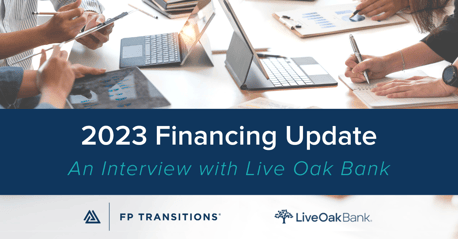Blog
Select Topic:
Posted by FP Transitions on May 8, 2024
Considering Key Stakeholders
ARE YOU CONSIDERING THESE IMPORTANT STAKEHOLDERS IN YOUR TRANSACTION?
Finding the right transaction partner, and executing a potentially complicated and emotional transition, can attract most of the consideration in an M&A deal. It’s important to...
Posted by FP Transitions on February 13, 2024
Buyer and Seller – Finding the Perfect Match
One could argue that the open market acquisition process is a bit like online dating. Using a finite amount of fields and characters you must convey to someone–whom you’ve never met and know a limited amount of information about–that you are worth...
Posted by FP Transitions on November 23, 2023
The Dangers of Napkin Negotiations
The financial services industry is a personable one. Professional networking and client prospecting depend on your charisma and ability to connect beyond surface pleasantries. But when it comes to selling your business, it’s important to keep your...
Posted by FP Transitions on September 5, 2023
Independent Advisors Will Unlock the Future (If They Can Hold Onto the Keys)
Even though it had been in the works for years, last month’s Schwab/Ameritrade merger left both organizations’ advisors wondering what it meant for them. The good news is that the transition has been seen as largely successful, with only some tech...
Posted by FP Transitions on August 30, 2023
Selling Your Practice, One Chance to Do it Right
The decision to sell a financial services practice is a difficult one for any advisor to make. After a lifetime of work to build your business, and after years of earning your clients’ trust, how do you turn the job over to someone else? Will they...
Posted by FP Transitions on July 24, 2023
Price, Not Value, Is a Product of Negotiation
Price is usually the most difficult hurdle for buyers and sellers to overcome. The value of a business is different for each party participating in a transaction and is based on opinion and the specific set of circumstances for each individual....
Posted by FP Transitions on July 24, 2023
Lending for Successors: What Advisors Need to Know
If you are preparing to become the successor of an RIA firm, you may have a lot of questions and concerns about how to negotiate the best deal and what lending options are available to help you finance the succession.
To help you answer these...
Posted by FP Transitions on February 27, 2023
2023 Financing Update - An Interview with Live Oak Bank
We’re coming off an incredible year from mergers and acquisitions yet again. In fact, we closed out 2022 as one of our greatest ever for FP Transitions, and the same goes for Live Oak Bank. We took a moment to reconnect with James Hughes, SVP of...
Posted by FP Transitions on June 28, 2022
Surviving Deal Fatigue
Despite the continued surge of wealth management M&A activity, one surprising fact remains: most of these market participants are engaging in a transaction for the very first time. While there are aggregators and larger RIAs that will continue to...
Posted by FP Transitions on November 29, 2021
KPIs. What are Key Performance Indicators, and how do you Leverage them?
KPIs, or Key Performance Indicators
During a recent webinar hosted by FP Transitions, several attendees had questions about KPIs. Marcus Hagood Director of Equity Management Solutions®at FP Transitions, and Mike McKennon, EMS™ Consultant at FPT,...Posted by FP Transitions on July 30, 2020
Considering Key Staff During the Sale of Your Business
It’s hard to keep secrets in a small office. The rooms are tight, the walls are thin, and it’s just a matter of time before everyone knows everyone else’s business. Even when an owner has quietly decided to sell their practice, they should assume...
Posted by FP Transitions on July 22, 2020
Buyer Benefits of a Sell and Stay® Transaction
The Sell and Stay® approach to selling a financial services business was developed by the professionals at FP Transitions to fulfill the preference of many sellers to gradually exit the business by giving up their ownership obligations while...


/Blog%20Banner%20-%20The%20Dangers%20of%20Napkin%20Negotiations.png?width=458&height=280&name=Blog%20Banner%20-%20The%20Dangers%20of%20Napkin%20Negotiations.png)
/Blog%20Banner%20-%20INDEPENDENT%20ADVISORS%20WILL%20UNLOCK%20THE%20FUTURE%20(1).png?width=458&height=280&name=Blog%20Banner%20-%20INDEPENDENT%20ADVISORS%20WILL%20UNLOCK%20THE%20FUTURE%20(1).png)



.png?width=458&height=280&name=Blog%20Header%20Image%20(6).png)
.png?width=458&height=280&name=MicrosoftTeams-image%20(7).png)

